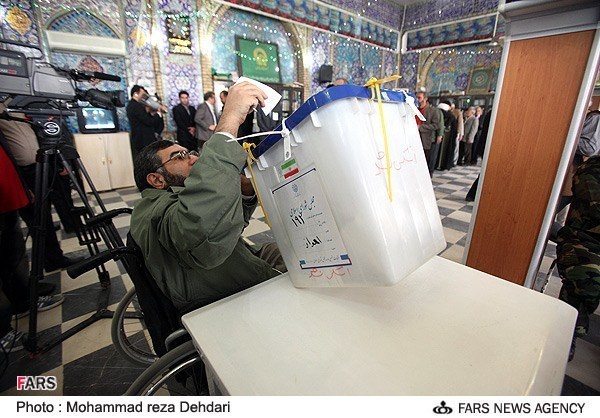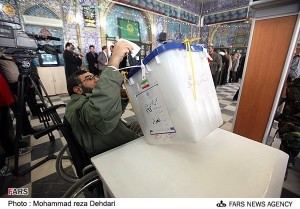Iranians vote in parliamentary election

 The Iranian people flocked to polling stations across the country on Friday to vote for representatives to fill the 290-seat parliament for the next four years.
The Iranian people flocked to polling stations across the country on Friday to vote for representatives to fill the 290-seat parliament for the next four years.
The turnout was so high that the Interior Ministry was compelled to extend the deadline for casting ballots by two hours, to 10:00 p.m. local time.
Tehran Governor General Morteza Tamaddon said that the turnout in Tehran Province was much higher in comparison with previous parliamentary elections.
“Tehran set a new record in terms of participation in the Majlis election,” Tamaddon told reporters.
He said that certain polling stations in Tehran and nearby cities ran out of ballot papers.
There were 3,467 candidates contesting the election, and about 48 million people were eligible to vote.
It was the 9th parliamentary election since the victory of the Islamic Revolution of 1979.
Deputy police chief Ahmad Reza Radan and the Interior Ministry both said that there was no major security threat associated with the election anywhere in the county.
Increase in voter turnout
Guardian Council spokesman Abbas Ali Kadkhodaii said that according to the reports published until 11:00 a.m. – three hours after the polling stations opened – voter turnout showed an eight to nine percent increase in comparison to that of the last parliamentary election in 2008.
Asked about the people’s enthusiasm for the election, he said that in some polling stations, the people reportedly had queued to vote four hours before the election began.
Leader says high turnout will help enhance national security
The Leader of Islamic Ummah and Oppressed People Imam Sayyed Ali Khamenei said that in light of “verbal threats” against Iran, people’s participation in the election was of great importance.
After casting his vote, Khamenei stated that a high turnout benefits the “future”, “security” and “dignity” of the country.
“If people come (to polling stations) with more enthusiasm, it will be more useful and better for the future and dignity of the country. It will be more useful for the security and protection (of the country),” the Supreme Leader observed.
Voting is a national right
Chairman of the Assembly of Experts Ayatollah Mahdavi Kani expressed hope that the election would give a strong response to the enemies of the Islamic Revolution.
“We hope that the ninth Majlis election will be a strong punch on the mouth of our enemies,” Mahdavi Kani said after casting his ballot.
The ayatollah added that participation in the election was “a legal, religious, and national right.”
Guaranteeing the future of the revolution
After casting his vote, Akbar Hashemi Rafsanjani said, “I hope that the next parliament will help resolve the existing problems and guarantee the future of the revolution.”
Rafsanjani also stated, “We hope that a Majlis could be formed that could play an effective role in special circumstances.”
The Expediency Council chief added, “We ask God to protect the revolution, forces of the revolution, and the families of the martyrs for us.”
MPs should be brave and independent
Ayatollah Lotfollah Safi Golpayegani said that those who are elected as parliamentary representatives should try to reduce the burden on the country’s poor.
“Representatives should care about the poor and take steps to help alleviate their burden,” the ayatollah said after casting his vote in the holy city of Qom.
He added that representatives should explore ways to resolve economic problems and curb inflation.
He also said, “Representatives of the Islamic Consultative Assembly (Majlis) must be independent, brave, and faithful.”
Hope for the future
Ayatollah Ebrahim Amini, the leader of Qom’s Friday prayers, said that the people are expected to vote for the “most qualified persons because the fate of the country is dependent on their choices.”
He also called on the people to vote despite the fact that the country is facing some problems.
“I do not deny the existence of problems in the country, but domestic and foreign enemies are trying to encourage the people not to take part in the election. Boycotting the election will not solve any problem. Rather, (the people) should take part and elect the most qualified persons to help resolve the country’s problems.”
He added, “We expect the elected candidates to seriously address the people’s problems and make them hopeful.”
Elected candidates should not betray people’s trust
Majlis Speaker Ali Larijani, who is seeking reelection for the Qom
constituency, said that those candidates who succeed in winning the people’s confidence “should respect people’s confidence.”
Through voting, the opponents of the Islamic Republic will realize that the Iranians are “united and determined” to safeguard their revolution, Larijani told reporters in a polling station in Hazrat Ma’soumeh (SA) mausoleum, where he had gone to vote.
He added that the Iranian nation would use the election to decide its fate and to provide a “response to the enemies.”
Former president Khatami votes
Former president Mohammad Khatami cast his ballot in the village of Vadan, near the city of Damavand, the governor of Damavand told the Mehr News Agency.
Khatami was accompanied by his brother. It is said that Khatami’s brother has a villa in Vadan village.
Hassan Khomeini casts vote in Hosseinieh Jamaran
Hassan Khomeini, the grandson of Imam Khomeini, cast his vote in Hosseinieh Jamaran’s polling station.
Hassan Khomeini refused to talk to reporters after he cast the vote.
Election monitors
Seyyed Abdolvahed Mir-Ashrafi, the chairman of the supervisory board in Tehran, said that 19,000 people monitored the election in Tehran.
National Prosecutor General Gholam Hossein Mohseni-Ejeii said that the election is of “special importance” as the enemies are trying to foster a feeling of social dissent in the country.
In reply to a question on security situation for the election, he said that the number of election violations had reduced greatly compared to the previous elections.
Former foreign minister Manouchehr Mottaki said that a large turnout would affect Iran’s expected talks with the 5+1 group.
“This presence will affect our country’s negotiations, including future dialogues with the 5+1,” Mottaki told reporters.







